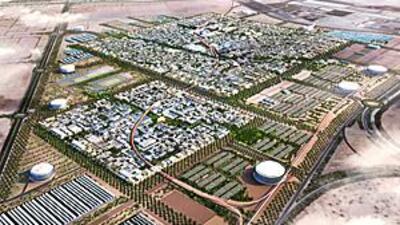For a presentation that was focused on the future of the car and the sweeping changes that could be expected, the initial message from the chairman, Dr. Raúl Meyer of Ricardo plc, was of, quite simply, "status quo". "We see, short term, up to 2015, which is actually tomorrow for technology development, there is an evolution of the internal combustion engine," said the head of the UK-based car company. "The improved technology will offer best-value solutions and will stay around in the short term, mixing with new alternatives as an impact of regulations.
"Medium term, 2025, again, technology will be more diverse to satisfy sector and previous specific applications. But evolved current technology [of the internal combustion engine] will still play a strong role." And so started the transport part of discussions at the World Future Energy Summit in Abu Dhabi on Tuesday afternoon. The next two speakers, Henrik Fisker and Dr Jan-Olaf Willums, couldn't have been further from Meyer's view.
Fisker, head of Fisker Automotive, spent his 15 or so minutes speaking about his forthcoming Fisker Karma hybrid car and the impact it will have on lowering city pollution. Stressing the car is a practical alternative for luxury-minded buyers, the former designer for Aston Martin and BMW pointed out that his car can make a difference today using existing infrastructure. The fact that owners could travel 80 kilometres on batteries alone, yet venture for longer distances with the petrol-powered electric generator, made the car a viable vehicle. Indeed, at least 1,300 people believe him, as that's how many have bought his car even though delivery doesn't start until November. (see mo8).
Willums is a founding board member of Think electric cars. Unlike the Fiskers, his cars are pure, plug-in electrics and aimed at a much lower price bracket. And, instead of simply selling cars, he views a car and battery sharing scheme as making electric cars cost-effective in city centres. The talks continued with John Mogge Jr, the senior vice-president of CH2M Hill. Mogge discussed the future of personal rapid transit and the future of the carpod at Masdar City, where his company will test 13 PRTs in September.
Perhaps the oddest presentation was from Dr Antonia Terzi, with the Superbus proposal. Basically a long, low, 32-passenger bus capable of speeds around 200kph, the Superbus seemed a little far-fetched, even in this realm of futuristic travel ideas. Capping off the talks was Dr Nazeer Bhore of Exxon-Mobil. How does an oil company contribute to lower emissions, you ask? First by finding cleaner ways to produce fuel, and then by making lighter plastics for cars, more airtight tyre liners, lithium-ion battery components, cleaner engines and on-board hydrogen producers.
Admittedly, most of the discussions may have been a bit much for those not so keen on the technological side of alternative transportation. The rest of the summit, which spanned Monday to Wednesday and was packed with solar panels, windmills and journalists jostling for free coffee, had a small but encouraging contingent of displays with varying views on the future of transportation. The centrepiece was, of course, the Masdar carpod. It's modern lines attracted anyone passing by to sit inside and experience the future first hand. Right beside that was a large display by General Motors, showcasing its Chevrolet Tahoe hybrid, which is undergoing evaluations in a fleet of taxis in Dubai. GM was the only major manufacturer in attendance; disappointing, especially considering the amount of attention electric cars were given at the Detroit motor show, which ends tomorrow. Nearby, Shell showed off one of its tiny Eco-marathon solar-powered cars, which resembled a coffin on bicycle wheels. With a hydrogen fuel cell, it could go 250 km on a tiny tank. Further on down, the Solar Taxi was on display in the Swiss pavilion, where you could talk with the Taxi's affable owner, Louis Palmer, while munching on exquisite Swiss chocolate. Yum.
But the show didn't rely solely on odd or futuristic cars. The Exxon-Mobile stand displayed all that Bhore talked about in his presentation. "A vehicle 10 per cent lighter gets seven per cent better fuel economy," he enthused. Other booths focused on alternative fuel sources. Intelligent Energy from the UK creates fuel cells for Suzuki, Peugeot Citroën, Lotus and other companies, while Hydrogenics, among other companies, focuses on fleets of forklifts and buses. Linde of Germany focuses on, among other things, a hydrogen infrastructure, which represents the major hurdle in getting fuel cell cars on the road in the near future. Kompgas promises to turn your garden waste into fuel for your car. There was even a company that turned shredded tyres into material to replace asphalt.
Despite the different technologies, one thing united everyone involved with the show - the passion they had for making real change in the world, starting from the road. nvorano@thenational.ae

